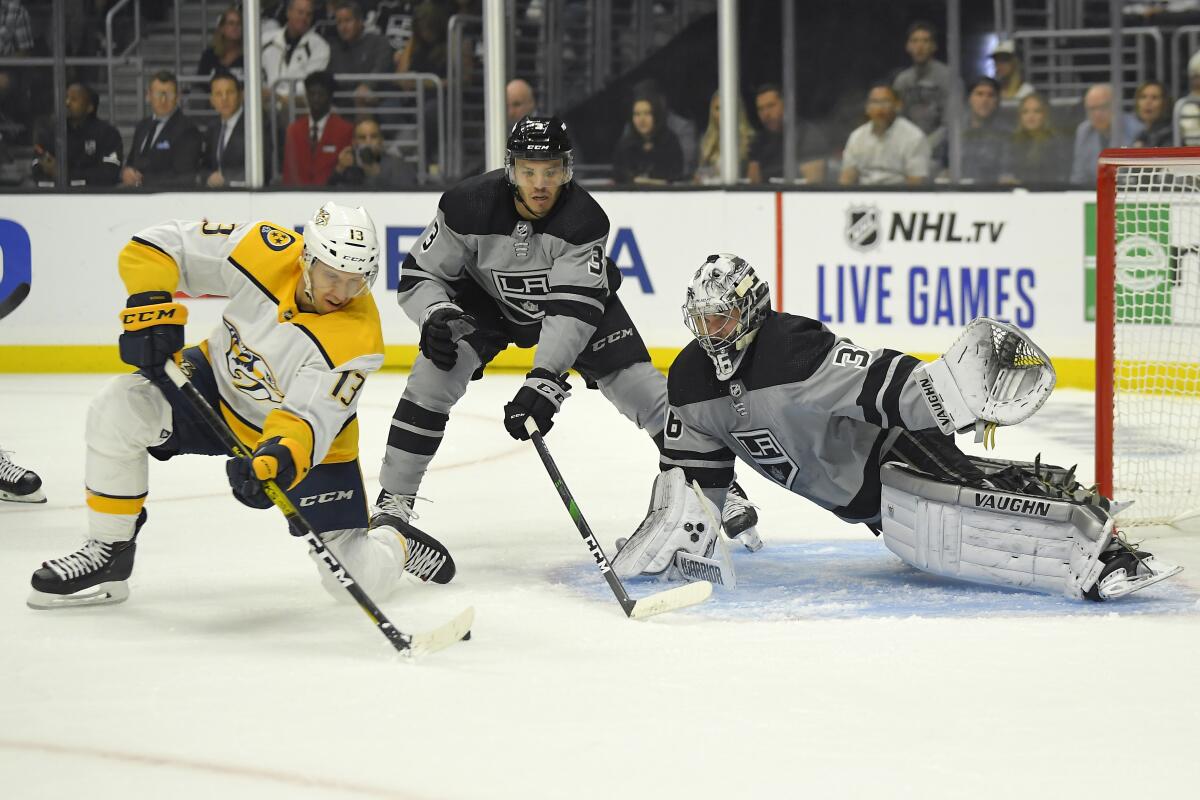Kings see errors of their way with passive play late in games

- Share via
The good news for the Kings: Twice already this season, they’ve built three-goal leads against the Calgary Flames and Nashville Predators, division-winning teams from a season ago. In three of their four games overall, they’ve led in the third period.
The bad news: They have squandered their advantage each time, leading to a loss in their season-opener against the Edmonton Oilers and the need for late rallies to salvage wins against the Flames and Predators.
Excluding empty-net goals, the Kings have been outscored 11-4 during the third period this season. Against the Predators on Saturday, they began the final frame leading 4-1, only to allow three unanswered goals in the first 11:30 of the third. Of all their early-season concerns, their shaky play near the end of games has been perhaps the starkest. For coach Todd McLellan, the issue begins with identity.
“In the third, we reverted back to something we don’t want to be,” he said Saturday. “That’s being really passive and standoffish. There were a number of times where we were in a standoff type of forecheck, and that’s not the type of team we want to be.”
The Predators’ goal early in the third period provided an example of what he’s talking about.
The chance began behind the Predators’ own net, where defenseman Ryan Ellis handled the puck behind the goal for several seconds. It allowed the Predators to run a full-ice breakout. Ellis banked a long pass to forward Calle Jarnkrok in the neutral zone. He quickly fed Viktor Arvidsson, who flew across the Kings blue line. Moments later, Arvidsson would score after just two passes.
“I don’t think once we ever stood off and let them manage their breakout from behind their net in the first two periods,” McLellan said. “In the third, there were probably five or six times in a row where we’re standing off, they’re getting what they want, they get fresh players on the ice, they get to play long, we didn’t make it difficult on them.
“That is not what we want to be,” McLellan continued. “We want to be what we saw for the first two periods.”
Applying pressure allowed the Kings to build their three-goal lead. Their fourth goal, for example, came as a direct result of the forecheck.
Forward Ilya Kovalchuk chased Predators defenseman Dante Fabbro into the corner, forcing him to attempt a weak back-handed clearance up the boards. Kings center Michael Amadio held it in, won a puck battle, then saucer passed a back-door feed to Kovalchuk.
“I think pressure on the puck is key,” forward Dustin Brown said. “Because guys are just too good now. Give most defensemen in the NHL now three seconds to make a play, it’s going to be out of your [offensive] zone.”
Asked why his team again couldn’t hold a three-goal advantage, Brown started his answer with the obvious: “We’ve got to learn how to protect a lead,” he said.
Then he stopped himself and changed the message.
“Actually, not even protect a lead,” he continued. “It’s about going after it when we have the lead still. I think we maybe took our foot off the gas. Then our forecheck doesn’t work and out neutral zone doesn’t work. Then we’re playing D-zone.”
The Kings in recent seasons had grown accustomed to retreating to their own end and relying on relentless defensive zone coverage.
McLellan’s philosophy is different. When done right, “it’s much more aggressive, we’re turning over way more pucks,” Brown said. “I don’t want to compare it to years past, because it’s a completely different team, different system and everything.”
Whether the Kings’ lead-blowing habits are simply a growing pain this season in that adaptation process or a more serious flaw is yet to be determined.
The Kings responded with three goals, including two empty-netters, in the final minute to survive. This time, their near-collapse in the third period didn’t cost them.
“We’re starting to develop our identity,” McLellan said. “We slipped back a little bit every now and then. That’s why there’s so much inconsistency in our game. Once we get it and everybody buys in for a full 60, we’ll be fine.”
More to Read
Go beyond the scoreboard
Get the latest on L.A.'s teams in the daily Sports Report newsletter.
You may occasionally receive promotional content from the Los Angeles Times.







